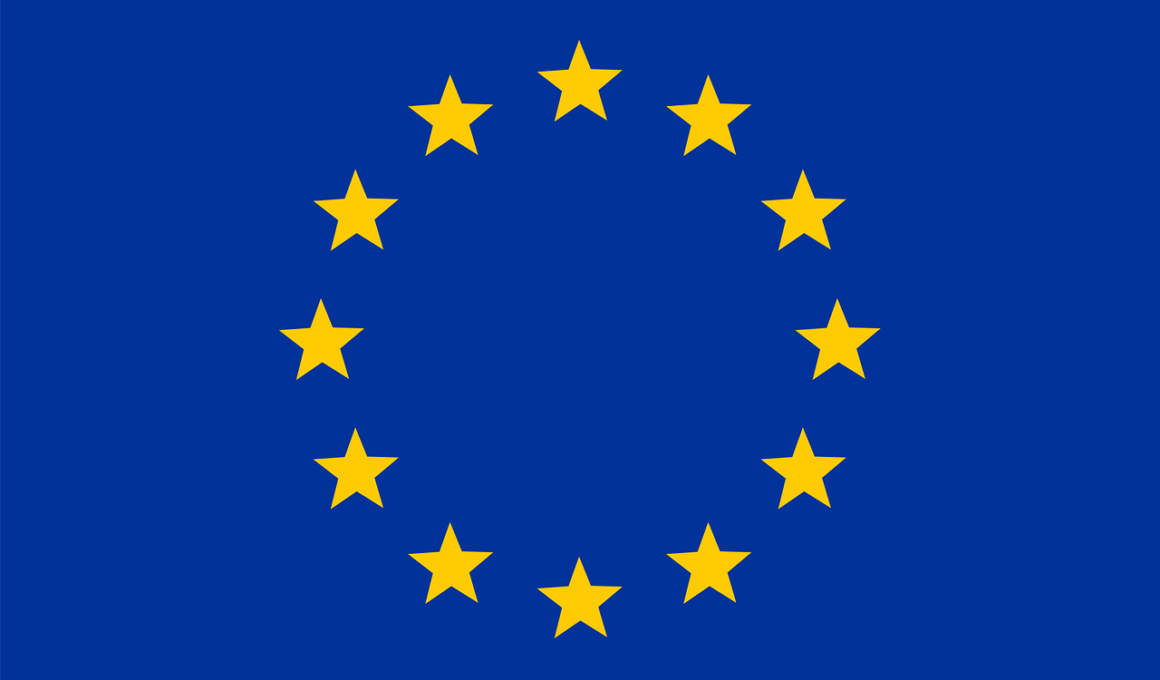How the Capital Markets Union (CMU) Plans to Transform European Finance
The Capital Markets Union (CMU) initiative is pivotal in reshaping European finance. Its primary goal is to increase the flow of investments within the European Union (EU) by integrating countries’ capital markets. By removing barriers and improving accessibility, the CMU aims to foster financial stability and growth across member states. This initiative will simplify cross-border investing, which can enhance opportunities for businesses, especially small and medium-sized enterprises (SMEs). Enhanced access to a diverse pool of financial resources facilitates innovation and development, promoting economic resilience. Implementing standardized regulations across the EU is essential, as it leads to transparency and efficiency within financial transactions. This increased regulatory clarity will help financial institutions better negotiate the landscape of investing. Moreover, the CMU will focus on risk diversification, allowing individuals and institutional investors to spread their investments across various sectors and geographic regions. Overall, the CMU aims to create a more integrated and robust European financial system, attracting international capital and promoting sustainable development within the EU.
The CMU initiative seeks to complement existing financial frameworks within the EU, primarily focusing on enhancing accessibility. A well-integrated capital market fosters competition, ultimately benefiting consumers by lowering costs and improving financial services. Key objectives include increasing market liquidity and developing a diverse array of financing sources. One significant component of the CMU is the promotion of securitization, which allows banks to free up capital for additional lending. Furthermore, the CMU aims to create an environment conducive to investment in long-term infrastructure projects while supporting innovation in the financial sector. Another essential aspect is facilitating investor education, empowering individuals with the knowledge to make informed decisions about their investments. By emphasizing inclusiveness and transparency, the CMU reduces the risks associated with cross-border investments, stimulating economic growth. SMEs will likely experience increasing access to diverse funding options, which can drive innovation and job creation. In addition, aligning regulations across member states enhances trust between investors and financial markets, resulting in a more stable financial environment. This transformation paves the way for a vibrant European economy geared toward long-term sustainability.
The Role of Regulatory Harmonization
Regulatory harmonization is central to achieving the goals of the Capital Markets Union. By establishing a uniform regulatory framework, the CMU aims to eliminate discrepancies that hinder cross-border investment. A cohesive approach to regulation ensures that businesses can compete on a level playing field, promoting fairness and efficiency in the financial markets. The CMU outlines several directives aimed at standardizing regulations, which facilitates smoother transactions throughout the EU. This harmonization fosters greater confidence among investors, who can be assured of the same protections regardless of where their investments reside. Additionally, clear regulations alleviate the regulatory burden on cross-border service providers, thus encouraging them to offer their services across multiple jurisdictions. Reducing compliance complexity leads to cost savings for financial institutions, which in turn benefits consumers through lower fees and better services. Initiatives such as the European Supervisory Authorities (ESAs) work towards establishing consistent guidelines, ensuring structured oversight and accountability within the financial landscape. As the CMU takes shape, ongoing collaboration between member states will be crucial to ensure that regulatory frameworks address emerging challenges while maintaining market integrity.
Another critical aspect of the Capital Markets Union is fostering financial innovation through technology. Financial technology, or fintech, is disrupting traditional financial services by offering improved accessibility, efficiency, and transparency in transactions. The CMU encourages the integration of fintech solutions within the European financial landscape to enhance investor experiences and stimulate growth. By leveraging cutting-edge technologies, such as blockchain and artificial intelligence, the capital markets can evolve to meet the demands of modern investors. Additionally, the CMU recognizes the importance of cybersecurity as an integral component of financial innovation, ensuring that investor data remains protected while fostering trust in digital platforms. By nurturing a collaborative environment between traditional financial institutions and fintech start-ups, the CMU aims to create a vibrant ecosystem where innovative solutions can flourish. Furthermore, regulatory authorities must remain agile and responsive to the rapid pace of technological change, enabling them to adapt regulations that promote innovation while safeguarding consumers. Overall, fostering fintech within the framework of the CMU will be essential for unlocking opportunities and ensuring that European financial markets remain competitive on a global scale.
Supporting Sustainable Investments
In recent years, there has been a growing emphasis on sustainable finance and the role of the Capital Markets Union in promoting environmentally friendly investments. The CMU acknowledges the need to align financial flows with economic objectives that support sustainability and address pressing societal challenges. By creating an integrated market for sustainable investments, the CMU aims to facilitate the transition to a low-carbon economy while enhancing the resilience of European financial systems. This involves establishing clear definitions and standards for what constitutes a sustainable investment, creating green bonds, and fostering ethical investment practices. The CMU will also support initiatives aimed at increasing transparency in investment choices, empowering investors to make informed decisions regarding their financial contributions. Additionally, the CMU encourages collaboration between financial institutions, governments, and civil society to raise awareness and mobilize capital for sustainable projects. As a result, the CMU will not only contribute to economic growth but also promote responsible and sustainable practices across sectors, addressing climate change and promoting social equity within the European Union.
The implementation of the Capital Markets Union requires active participation from various stakeholders, including financial institutions, regulators, and policymakers. Successful collaboration hinges on transparent communication and mutual understanding of goals among all parties involved. It is imperative to engage stakeholders early in the decision-making process, as this fosters buy-in and commitment to the initiatives outlined in the CMU. Financial institutions play a pivotal role in driving innovation and supporting sustainable practices, helping to align market incentives with the broader objectives of the Union. Moreover, regulatory bodies must work together to identify barriers to cross-border investments and collaboratively address these challenges. Policymakers should also take an active stance in promoting public awareness of the benefits of capital markets integration. Enhancing investor confidence through education and outreach initiatives will ensure wider acceptance of the CMU proposals. Finally, continuous evaluation of the CMU’s progress is essential to identify areas for improvement and ensure long-term success. Establishing metrics for measuring effectiveness and stakeholder engagement will be crucial in creating an adaptive and truly integrated European financial landscape.
Conclusion and Future Prospects
The Capital Markets Union initiative represents an ambitious vision for the future of European finance. The successful execution of its objectives has far-reaching implications for economic growth, sustainability, and resilience within the EU. By fostering a more integrated capital market, the CMU promises to create an environment that nurtures innovation while promoting responsible investment practices. Looking ahead, ongoing collaboration between member states, regulators, and financial institutions will be essential for realizing the full potential of the CMU. As challenges arise, stakeholders must be prepared to adapt and refine their approaches to ensure that the CMU remains relevant in a rapidly changing financial landscape. Continuously assessing market dynamics, investor needs, and technological advancements will lay the groundwork for an inclusive and sustainable European finance system. By prioritizing stakeholder engagement and transparent communication, the CMU can achieve its transformative vision for capital markets. Ultimately, the CMU has the potential to strengthen the European economy, attract global investments, and empower businesses and investors alike to thrive in a modern and dynamic financial environment.
As the world moves toward a more interconnected economy, the Capital Markets Union will remain a cornerstone of European financial integration. By embracing innovation, sustainability, and collaboration, the CMU seeks to redefine the landscape of financial services within the EU. The growth and stability of the capital markets are crucial not just for businesses but also for citizens, who rely on stable financial systems for their livelihoods. The potential benefits of the CMU are vast, from stimulating job creation to fostering investments in sustainable development. As stakeholders commit to realizing the CMU’s vision, it is imperative that they continue to prioritize inclusivity and transparency. The role of education in navigating the new financial landscape cannot be understated, ensuring that all investors have the tools and resources necessary to make informed decisions. Furthermore, the CMU will play an essential role in addressing global challenges, such as climate change, by directing capital toward forward-thinking projects. In conclusion, the continued commitment and engagement of all stakeholders are essential for the successful transformation of European finance through the Capital Markets Union, ultimately shaping a resilient and adaptive financial future.


